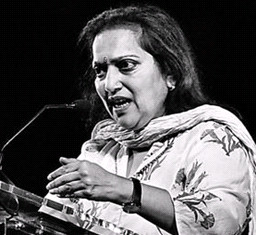
‘Out of six million in 18-24 age group, only 16 per cent get higher education’
Kirti Menon, Registrar, Wits University, Johannesburg, and a great-granddaughter of Mahatma Gandhi, on Wednesday highlighted the problems of access to higher education in South Africa for a majority of population even 19 years after the end of apartheid.
She was speaking on “Education in South Africa: A Game of Snakes and Ladders” at the sixth D. D. Kosambi memorial lecture series of “Festival of Ideas” here.
Ms. Menon listed the major problems as rising costs of higher education, socio-cultural, and capital access problems of major section of students, need for more investment in higher education in science and technology, need for enhancing infrastructure in universities and above all dried up donor-funding.
She said the State was still unable to prioritise the equal access to higher education by establishing the relationship between access to higher education and to labour markets, and equalising both in terms of labour market access and equality of opportunity.
“It is no longer acceptable to fail people. It is part of surge of democracy that delivery to poorest of poor is prioritised on par with people of other classes,” she said underlining the need to address structural flaws in the post-apartheid society for achieving real equality of opportunities.
Unveiling the enormity of the problem, she said out of six million people aged between 18 and 24, approximately 16 per cent were in higher education.
She spoke of the need for a radical thinking to bring about a drastic change in the situation as there were inherent problems of complex nature. For instance, she said, that on one hand there was a dearth of science, engineering professionals, shortage of doctors still needing import of science and other teachers, and on the other because of poverty and their rural background, there was a huge problem of dropouts not only at the school level but also at the university level with a large number of students hopeful of completion of university education failing to cope.
She spoke of a mismatch between the human resource turned out by higher education system and the requirements of the labour market.
Ms. Menon lamented that after 19 years of end of apartheid, the higher education though was legally available to all, in reality a huge section of society was unable to avail the benefits of it. Nearly 25 to 30 per cent of the people were on some form of financial aid. Students from rural areas had great difficulty in coping with university education, she stated and added that students from some places come without cultural skills.
Speaking about difficulties faced by poor students, she said that the higher education was designed to put the high cost on students who could ill-afford it. Added to that, tuition fees were increasing at a rate higher than inflation.
Giving the analogy of “snakes and ladder” situation to the whole complex problem of higher education, Ms. Menon said: “Not by any legislation but by some pervert forces of business, we are excluding some sections of their right to access to higher education.”
In that context, she spoke of delays and time lags between policy formulations and implementation. She spoke of some institutions which were historically disadvantaged.
Planning models which spoke of ideal socio-economic conditions, were not taking into account world economic recession. She revealed how impact of very limited funding which meant burden of education funding shifts to students.
“It is indeed a terrible game of snakes and ladders,” she remarked and added: “Each time we move ahead we come crashing down. We must not underestimate the impact of apartheid.”
To a question she said they had a lot of donor funding. But donor funding for South Africa was drying up. “Donor funding goes to popular countries. It is no more popular country,” she said.
She lists the rising costs of higher education as a major problem
‘There is a gap between the quality of human resource and the needs of the market’
Caption: Holding forth: Kirti Menon, Registrar, Wits University, Johannesburg, South Africa speaking on ‘Education in South Africa: A Game of Snakes and Ladders’ in Goa, on Wednesday.
By Kirti Menon
